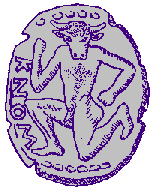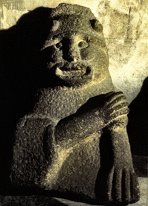Websites
|
HAPPINESS by Joseph N. Abraham, M.D. XYZ books, 2000 - ISBN 0-9672950-0-9
(Of course, Paradise is where we are without flaw or fault - and can indulge ourselves faultlessly and eternally in all our biocidal acts without the opposition of an earthly environment.) A compilation of the single ideas of self-help books (a few have two or even three - and those by the famous Tibetan Chögyam Trungpa have well over a dozen, while those of the unjustly-notorious American Carlos Castaneda have perhaps half a dozen) would make an interesting book indeed, and the happy author thereof need do no more research than walk into a large bookstore one morning and spend the day skimming through the dozens of self-help books on offer, and murmur his findings into an invisible cassette machine - since bookstore staff do not like people walking in and writing notes on pads. Maybe I should do this myself and call the resulting slim volume The Ultimate Self-help Book - or something a bit more catchy - like Dying Can Be Fun. But perhaps the book - if accepted by a greedy publisher - would be remaindered both because it would be too much for today's dumbed-down reading public, and because it was not by an academic parading meaningless letters after his name, as the increasingly embattled Noam Chomsky does not do. Of course, every author thinks (or hopes that his or her readership thinks) that his or her book is the ultimate self-help book. Authors are (by definition) vain people (in both senses of the word). Dr Abraham is one of those few who has more than one message. His main one is that his Anglophone readership is obsessed with success. America particularly depends on several underclasses of losers throughout the world, and a ruling class of winners. But the only thing worth winning, Dr Abraham thinks, is happiness. This is itself a very American idea, for the word is incongruously included in the romantic Declaration of Independence (not the hard-headed and deliberately anti-party-political Constitution), where it (together with life and liberty) is linked with the upper class notion of pursuit, as of a fox, a hare, or a bear. Happiness is defined neither in the Declaration nor in the book I am discussing. Let us assume for the moment that what is meant is Deep Contentment, a feeling of self-fulfilment (even though I know full well that the latter does not produce the former). The two current obsessions of Americans are success and happiness - so why aren't the successful happy, and why are the genuinely happy invisible ? There are of course many who claim to be happy (mainly Christians), but they declare it so much that one is bound to doubt it, for the truly happy would not be demanding our attention - and less still our money! If money produced happiness, everyone would be giving it away and it would have no value. "Scientists" have just discovered that the receptor-spots for pleasure/happiness, and for desire are in different places in the brain. So desire has nothing to do with happiness - nor has the fulfilment of desire, which is why the successful are no happier than everyone else. This seriously undermines the thinking behind capitalism! Another reason why the successful are often unhappy (or at least eaten up with desire and ambition) is that they are successful only in climbing greasy poles and doing down their peers and anyone they see as 'competition', and to maintain this success they not only have to (literally) 'sell their souls' but have to work like hell to stay up the greasy pole. Is George W. Bush a happy man ? Is George Rumfeld or Condoleeza Rice ? Is any million- or billion-aire you have ever heard of ? Come to that, is there anyone whose biography you know even just a little, who could be described as 'happy' ? I cannot think of any famous or famously good person whom I could describe as 'happy'. Mother Teresa ? Definitely not: her life was given over to publicitous self-sacrifice. Mark Rothko, creator of some of the most wonderfully 'spiritual' art ever created, was profoundly miserable. Diogenes of Sinope - perhaps the wisest and most authentic human being in recorded history - was not a happy bunny, either. Chögyam Trungpa (the very wise and perceptive Tibetan mentioned above, who founded a prestigious college and publishing housein Colorado) was a predatory womaniser and a drunkard. Osho, the Maharishi, all those who went to Esalen, and the entire tomfoolery of Christian, Muslim and Buddhist saints are not famous for their happiness, but for what they said or wrote, suffered or endured. Certainly the wisest man known to me, who refuses to be a teacher since he rightly teaches that all teachers are bogus by definition, who refuses to have acolytes, followers, groupies, PhD students, publishers or others who can find their own wisdom if they would just adjust their vision and apply themselves, is not a happy man. Who can be merely happy, knowing that this planet of pain is screaming deafeningly - and all but a few of us are deaf. So far in this review, there has been no definition of happiness. Yet before anything is discussed, a definition acceptable to all must be proposed. It is surely not bliss - which is the state of permanent and pleasurable detachment. But bliss is certainly a state, whereas happiness is usually thought of as a feeling or bunch of pleasurable feelings. This cannot be, since feelings are subjective, and happiness is not. Happiness, like bliss, is a state. And because it is a state rather than a feeling, it may not even be conscious: those few who are happy, may be happily unaware of it. This may be why the happy are (when not suppressed) despised. Despised because of their pig-headedness in being happy enough (for happy enough = happy; I am not talking here about such infantasies as Eternal Bliss, Continuing Ecstasy, Coruscating Serenity and so on) living at the bottom of the heap, unnoticed and unnoticeable. To that extent, perhaps U.G. Krishnamurti is happy. Perhaps I also, since I seem to have a sunny disposition despite my nihilism and crushing awareness of the evil of mankind. But neither of us is going to mention it. Anyone who proclaims his or her happiness is most unlikely to be so, because the happy don't use words. Words are used exclusively by those locked into the concept of achievement. This concept is evidence of our hyper-evolution: we want to be what we are not, and we will destroy the whole planet in the attempt to turn our fantasy into grim reality. It is our Original Sin, which is only a religious way of saying that we are Nature's hubris, that we have evolved beyond the planet's ability to sustain us and our greed. (I am not talking childish fantasms of paradise, god-longbeard, serpent and pomegranate [mistranslated as 'apple']. Mankind's simple, fatal flaw is that we are social animals whose capacity for and addiction to deceit prevents us, increasingly, from behaving socially. That makes us unhappy. We instituted crude morality (in the form of religion) to try and contain our social and environmental destructiveness. But our addiction to deceit and our obsession with gadgets have outstripped the powers of mere morality to restrain us. And so, the richer we get, the more unhappy. We have all become outsiders, but very few of us are natural outsiders. I am such a 'lone wolf' and count myself happy - all the more so because I'm looking forward, in perfect health, to being dead and beyond the reach of mankind's galloping evil. (Curious that nobody talks about the right to happiness. Surely such a right is far preferable to the right to education which really means forcible socialisation, normalisation and infantilisation ?) But, to get back to Dr Abraham's book, he very subtly believes that the path to happiness lies in giving yourself permission to lose. In other words, to reject the opinion of other people and to understand that notorious Zen statement which in a sense means nothing at all: Zen mind, beginner's mind. I would prefer Zen to be less cosy than this - for Zen claims to be the antithesis of cosiness, which is why 'Zen Masters' have their pupils doing all those ridiculous subservient exercises - yet feed them cosy koans and vague statements which can be cosily understood. Most religions cater to cosiness of mind, which is why they are so utterly and emptily banal. Zen is no exception, though it tries to - claims to - abolish cosiness of mind. Now, Dr Abraham is surely right to tell us that the opinions of others are largely the fabric of the conspiracy of misery-in-power-politics which is the foundation of civilisation. Unfortunately, it is very difficult for most people to live (as I do) in a self-validating vacuum. They have to work (as I have never had to, being content being autonomous at the bottom of the heap of indigents) in order to eat. But he doesn't explain how the anxious conformists (almost all of us) can turn themselves into autonomous, happy beings through exercise of the reason which he displays. After all, 'society' deliberately creates anxious conformists to keep itself going. This is why the relatively-harmless drug cannabis was banned by the US long before anyone else banned it. Cannabis is a mañana drug unlike coffee, tea, alcohol, nicotine, or the most addictive and poisonous of all obtainable drugs, sugar. You can't have a workforce which takes cannabis. People who just want to be can't be relied on to do.
The Capitalist Doctrine in Three Words
As for self-improvement, this is discouraged except in the most banal forms, for looking into oneself is not only extremely difficult, and achievable only without consumer-products, but it leads to people 'dropping out'. Most of the cultures of the world - especially that of Islam - are set against social and self-examination. And most of the religions fail to point out that 'true' wealth is not money - but integrity, feeling good in one's heart and not fearful. Dr Abraham's book starts off with the grounding Buddhist asnd scientific premise that there is no reality. Everything is illusion, and most of our illusions are consensual, conspiratorial. The most terrible of these illusions is money, which has absolutely no reality - yet is visibly destroying the real world. The real world is 'dirt' ('soil' in British English) for from dirt/soil comes everything that sustains us which does not come from the oceans we are fast defiling into watery deserts. From dirt comes mind. From dirt comes happiness. Yet one of the present foundations of American culture is not so much the culture of fear of Terrorism promoted by government, but fear of dirt, rejection of their bodies as imperfect and defiled and only perfectible by the expenditure of large sums of money to the most greedy tribes - doctors, pharmacists, manufacturers, distributors and their accountants. Women have suffered for centuries not just from male contempt for their lateral thinking, their creative mode of conversation, their lack of interest in technology, but also - amazingly - from male perceptions of their impurity - usually menstrual and pre-/post-partum. Even more amazing is that women by and large have passively accepted this, as now in the West they accept perceptions which have shifted from fear of bodily function to desire for unnatural and even cartoonish appearance. Both men and women now are expected to be like non-personalities in comic strips. Body hair must be removed. Armpits must not only be washed daily (removing their enticing smell) but shaven as well and doused in expensively-marketed chemicals which (to me) smell carcinogenic and cannot possibly do the body any good. Whole areas of the body are shaven. Men who shave are surely afraid of their primary sexual characteristics, so men with beards get frequent jibes, and women with beards and moustaches (often very attractive to this trichophile) are invisible or treated like hunchbacks. Sexual attraction is now the domain of the eye as trained by sickening glossy magazine, and not of the nose which is programmed to revel in pheromones and produce showers of endorphins in the brain. So people have sex without natural stimulus - and wonder why sex doesn't make them happy. (One of the many reasons why I rarely watch American films is because the female actors are so characterless, so blank, so bland - so empty in their faces. When they are not bland, then they are grotesque as Bette Davis and Joan Crawford revealed themselves to be in the marvellous Baby Jane. Yet France - home of the cosmetics industry - produces sensationally characterful female actors like Jeanne Moreau, Cathérine Deneuve, Juliette Binoche - as well as characterful but hardly rugged (yet not plucked) males such as Daniel Auteuil and the ever-expanding Gérard Depardieu. In fact, had I been born and raised in France rather than in a backward Anglophone nomansland, I would probably not have developed my fascination for the reality of hairy men, but been happy to admire some of the hundreds of thousands of poised, assured, unaggressive and personality-full French women.) Another illusion may be - of course - the notion of 'happiness'. Unhappiness is visible, even tangible, but happiness is something of a will o' the wisp. Or is it just that the happy are not just invisible but also silent ? This may well be the case. But my highly-autonomous and undemanding dog Oscar displayed happiness with no effort and no falseness at all. He was happy at least five - perhaps fifty - times a day, and his happiness made me (albeit briefly) happy. Happiness may well be the Union with the Moment and the Moment's Environment that non-domesticated animals experience frequently and regularly if not continuously. Oscar taught me much. And since his death, what he taught me has sunk in. And I can now count myself as a happy person - since his death! And despite all I know about our loathsome species. While I was reading Dr Abraham's book I remembered a book I read many years ago, and pulled it out of my bookshelf. It is FLOW - The Psychology of Happiness, by Mihály Csikszentmihályi. I remembered it as 'a very good book' (I dispose of 'bad' ones immediately), but on re-reading it I realised that it was just another single-idea volume (over 300 pages of small print in the paperback edition). Flow in this book means absorption in something outside the self - the opposite of how we're taught to be. Csikszentmihalyi's idea is that if we can experience Flow in (almost) everything we do, we will be happy/content/fulfilled. If we don't feel Flow, we really shouldn't be doing - either because we are not in tune with what we want to do, or what we want to do (such as getting rich quick, having a lot of sex with different people, wanting power) is anti-Flow. Csikszentmihályi also refers to the completely satisfying absorption of animals in the Moment and the Moment's Environment and similar moments occasionally experienced by humans - especially (as we now know) the 'handicapped' such as those 'suffering from' Asperger's Syndrome, 'Autism' and Down's Syndrome. The rest of the book is impressively taken up with case-histories, with quotations from luminaries like Durkheim and Nietzsche, social anthropology, psychology and other fascinating material. This book rests on many years of thought and research, but it is not clear whether the flow that is discussed is directional (the flow of a river) or tidal - or (the flow that I recommend) circular, like that of water going down a plug-hole. We learn too much about, and too little from. Of course absorption outside the self is classically exhibited by such pleasant and common people as torturers, animal researchers and thousands of other 'respectable' people who seem 'happy in their work' or in their 'hobbies'. So one is forced to consider the moral dimension of 'happiness', not addressed by the non-religious , who can therefore quite reasonably take over the whole notion and call it 'salvation' or some similar appealing abstract. True happiness must also include complete and open acceptance of one's whole self, recognising the warts, psychoses, trauma, pettiness, stupidity and all. This is no New Age pap - nor is it self-analysing disappearance up one's own colon. It is more the 'Journey without Goal' that is one of Trungpa's many profound themes. Aborption in the Journey which is facing up to the self, acceptance of the self, and then the wearing of the self like a pair of comfortable shoes rather than the platinum collar that our culture sets up happiness to be. Happiness is very animal, very childlike (before adults have mauled the being of the child with their corrupt words and behaviour. It is often unconscious. Conscious happiness for me is the state of watching-empathising with a dog having one of his or her moments of joy. Dr Abraham would have done well to weave the idea of (circular) Flow into his book. It would have fed in nicely to his argument that one large source of unhappiness is a false (largely television-produced) perception of reality which makes us want and want. If your perception of reality is like that of a breakwater rather than a wave, of a concrete dam rather than a rippling stream, or of a canal rather than water circling round the plug-hole, then your life is going to be devoted to getting and achieving, and you are bound to be unhappy - not least because you destroy your ability to appreciate things alongwith the rest of the self you were born with. On the other hand, the readership his book is aimed at is definitely suburban and lawn-mowing if not 'gated'. He is wisely not writing for a coterie of intellectuals, nor is he trying to hook those who end up in Hare Krishna or very much worse. The kind of people who buy this kind of book buy many different ones, and if their lives are not changed by them, they will remember very little contained in them. And here the author comes up against a no-win situation! This book is unlikely to change anyone's life dramatically because its author recognises that such 'conversions' are bogus. Only the other day I listened with great embarrassment to a half-hour BBC broadcast about a student in Sheffield (Yorkshire) who had such a 'conversion' and founded a Retreat Centre which charges a cool £300 a month for people who think (if they think at all) that happiness is feeling good, to come and feel good about a lot of Tibetan mumbo-jumbo currently so popular in the West. It is so appealing, indeed, that I suspect the Dalai Lama is not all he is cracked up to be. Every word that the ex-student spoke in that broadcast sounded false. I have read books by other similar guys who have ended up as Rimpoches of this 'lineage' or that. I know an expert in Tibetan language and culture who runs a Buddhist college in southern England and courses in Oriental Philosophy, Sanskrit and Pali in an English university, whose whole life is a busy and anxious antithesis of the Buddhist teaching which he explains and perhaps proclaims. So full marks to Dr Abrahams for giving himself 'permission to lose' in a world run by the bogus, the mad, and those who strive anxiously to be bogus and mad, bad and dangerous to know: successful. But he turned himself into a publisher to produce his book... [discuss!] Swami Vrhka Baba, May 2005
Ernest
Becker (described as a 'melancholic existentialist')
wrote: There is indeed "original sin" - but
it is not ours.
"RIGHT PLANET - WRONG UNIVERSE." - Douglas Adams
|





